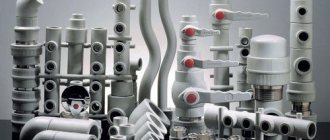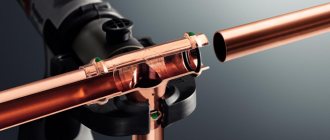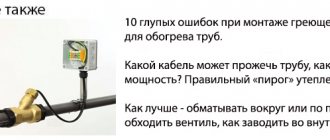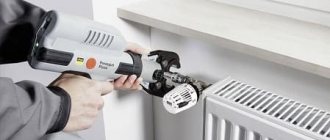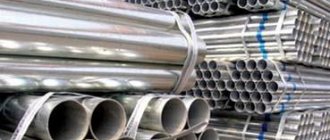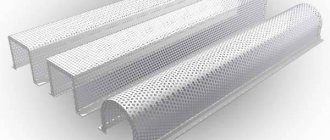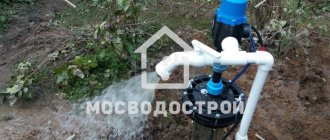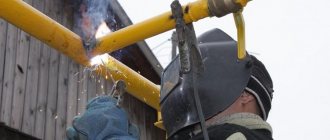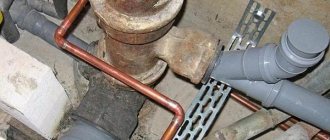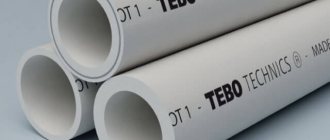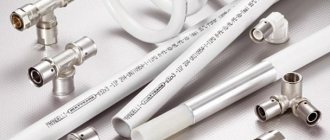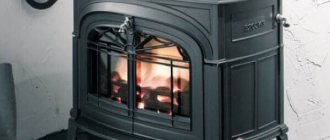Causes of clogging
Most often, steel pipelines become clogged. The inner surface of steel pipes is rougher, and plaque settles on it. In addition, steel is prone to corrosion - peeled rust plates also clog pipes. This is especially true for the heating system. The second reason for clogging can be the poor quality of water in the main water supply - it may contain sand, scale, slag, poorly soluble salts, and in some cases even biological contaminants.
The roughness of plastic pipes is approximately 20 times lower than steel pipes, so they can become clogged only when very contaminated water enters (for example, after accidents on main pipelines).
Cleaning methods
Cleaning methods should be selected depending on the location of the blockage, the length of the pipelines, the method of installation (welding or threading), and the ability to disconnect the pipeline from the main.
Before starting work, the condition of the pipelines should be assessed - it is better not to touch the old ones or use chemical cleaning methods.
Tapping with an ordinary hammer
The most affordable way to clean pipes from deposits is to tap the pipes with a regular hammer.
The pipe is not disassembled, gently and lightly tapped with a hammer, then the water is turned on - it will wash away the detached plates of rust or calcium deposits. It is worth tapping the system in parts - a separate section going to the bathroom, kitchen, toilet. Tap one area - rinse with water, then the next one - and rinse again. Otherwise, you risk clogging the system completely.
The great advantage of this method is that there is no need to disassemble the pipes.
Tapping can be performed not only by a home craftsman, but also by a home craftswoman.
Plumbing cable
One of the most effective methods of removing blockages is using a small diameter plumbing cable. To do this, you should block the access of water to the area being cleaned, dismantle the tap, mixer, or any threaded fitting. Then the cable is inserted into the opened hole and moves with rotation and is removed. Then the water is opened, the blockage is washed out, then the removed fittings are mounted back.
It should be borne in mind that the cable for heating and water supply systems should not be used for sewage systems; it should not be too “tattered” - it may simply not fit into the pipeline. It is better to use a ready-made cable with a metal ring at the end. You cannot use a cable to clean the metering unit (meter).
Pipe dismantling
If all of the above cleaning methods do not help, they resort to the most extreme option - dismantling the pipes. This is possible if the pipes are assembled on threaded fittings.
First the water is turned off. Then the parts of the pipeline are unscrewed, water is supplied under pressure using a hose and washed.
You can combine cable cleaning or chemical cleaning with high-pressure water washing.
The holes on the connection hoses for the toilet tank, faucet, and water heating tank often become overgrown. You can unscrew the hoses, carefully clean the “overgrown” hole (using a screwdriver or a narrow chisel), rinse it and screw it back on.
Traditional pipe cleaning
In most cases, the method of chemical descaling from pipes is used. Please note that only aggressive descaling agents can help get rid of limestone buildup. These include sulfuric, mineral, and nitric acids. Another important criterion for using chemical pipe cleaning is the presence of wear-resistant equipment that is accustomed to working with aggressive agents. If the installed pipes have been repaired more than once, their service life has come to an end, then chemical cleaning can only worsen the situation. Therefore, this work is carried out after inspection by specialists and their approval.
Removing scale from pipes using chemical cleaning is carried out using equipment: a pump supplying acid, hoses, and a container for supplying the solution. The concentration of acid depends on the degree of plaque in the pipes; the more plaque, the stronger the acid. However, this issue has its own nuances; the range of acid concentration values should not exceed 10% and should not be less than 3%. Every millimeter of plaque is 1% acid, but the concentration cannot be higher than 10%, since the acid can not only remove the build-up, but also eat the walls of the equipment.
As preventive measures to combat the formation of limestone buildup, less strong acids are used: formic, phosphoric. They are able to fight small scale formations, dissolve and remove them. A mechanical method for removing scale from pipes is often used. The cleaning procedure is carried out using scrapers, brushes, and rollers. The mechanical method is not the most effective, because the top layer of metal can be removed along with the scale. It is not recommended to carry out the procedure on an ongoing basis.
Expert advice
Do not use sulfuric acid (such as battery fluid) to clean pipes - it is unsafe to use and produces toxic compounds that can leach into drinking and shower water.
A favorite remedy for home plumbers, vinegar and baking soda are not effective for cleaning pipes.
Before cleaning, you should try to determine whether the entire system is clogged or whether only part of it is clogged - that should be cleaned.
Water meters can only be cleaned by flushing. You cannot clean it with a cable or chemically - you can damage the meter.
If there is a lot of plaque and it cannot be cleaned, it means that the meter is already 12-15 years old and you should think about replacing it.
After disassembling and reassembling part of the network, it is necessary to carry out hydraulic tests - fill the network with water and carefully check all joints for leaks.
Preventing blockages
There is virtually no real prevention of blockages. It is necessary to periodically clean the inlet strainers and the mixer filter from debris and scale, and rinse or clean the pipes. Removing debris has a surprisingly good effect on the pressure in the system. Metal pipelines still become overgrown with calcium deposits and rust.
If plastic pipes are regularly clogged, it means that there are a lot of mechanical impurities in the water - this is a sign of an emergency condition of the main networks. If such problems arise, you should contact the water utility (and possibly higher authorities).
How to clean a clogged water pipe at home
Residents of modern multi-storey buildings may encounter such an unpleasant phenomenon as a weakening of water pressure in the pipes. In order to find out whether this is a personal problem or a general one, you must first visit your neighbors in the riser. If everything is in order, they will most likely need to clean the water pipes located at the level of the point of problematic water supply.
Reduced water pressure from the tap may be caused by clogged pipes.
When to call a specialist
If you have never dealt with pipes, faucets, or household appliances, then call a plumber right away. You will have to contact a specialist if you were unable to clear the communications on your own. Perhaps your pipes are so clogged with deposits that they can only be replaced.
We recommend that you read: How to install a heating cable for drainpipes?
By replacing steel water pipes once with new ones, you will save yourself from problems with water supply to your apartment for decades.
Causes of clogging
Most often, a decrease in pressure is caused by deposits on the walls of the pipeline. Moreover, even if it is made of plastic components, because they are connected to metal pipes of the risers. It is in this place that you should look for the cause of the blockage.
A large amount of rust, in the form of layers, peels off from old pipes, and the flow of water carries it evenly along the entire length of the water supply.
Helpful advice! Although removing deposits and rust from the walls of water pipes is a very tedious procedure, do not put it off if you have the slightest suspicion. This way you will not only ensure comfortable use of the water supply system, but also forget about the problem of low pressure for the next 10-15 years.
Pipes may also become clogged with sand or other impurities. The reason for this is that over time their surface becomes rough.
Rust and other deposits accumulate even in plastic pipes
Modern pipe cleaning methods
Currently, there are special converters that effectively cope with the formation and removal of limestone build-up. These include ion exchange, electromagnetic, magnetic, and ultrasonic converters (filters).
An ion exchange filter softener is the most common and inexpensive method of combating scale. The principle of its operation is based on cartridge cleaners that are filled with sodium-rich ion exchange resin. As sodium ions pass through the hard water cartridge, they attract calcium and magnesium particles. Over time, the cartridge becomes clogged with hard deposits, the water is purified, and then the equipment is replaced. The installation cost is quite high, but if there is an urgent need for water treatment, this technology is used.
One of the most modern and effective methods for removing scale from pipes is an electromagnetic converter. This water purification filter is a small device designed to soften water and remove scale in pipes. A microprocessor is responsible for the operation of the converter, which generates electromagnetic waves by passing them through the pipes. An electromagnetic wave penetrates water, transforms hardness salts into sharp crystals, the strength of the wave is controlled via a remote control, it depends on the degree of water hardness. Sharp crystals of hardness salts come into contact with the limestone build-up, the crystals cut through the scale and are discharged into the sewer through water. The process takes quite a long time, but the efficiency of the electromagnetic converter is at the highest level.
Effective DIY methods for cleaning water pipes
Before starting work, it is necessary to localize the blockage. This way you will avoid additional difficulties during its implementation. In addition to the inner wall of the pipe, a blockage usually forms:
- on filters;
- in places of taps and valves;
- in the place where hot and cold water meters are installed.
In the best case, low pressure can cause contamination of the mesh obstacle in front of the column, washing machine, meter or faucet mesh filter. If their dismantling and subsequent washing with water does not help, the conclusion is clear: the pipeline is clogged.
Today, there are several ways to clean water pipes at home. The specific choice of one of the methods depends on the functional state of these elements of the water supply system, their course and location.
For example, cleaning water pipes from deposits in old houses is not the best solution. After all, blockages are usually present in large quantities in them. In this case, preference should be given to replacing pipes with propylene or metal-plastic products.
If there are filters installed in the pipeline, first you need to clean them
If one area turns out to be problematic, you can clean water pipes from rust using one of the following methods:
- Tapping with a hammer. To do this, remove the mesh filter, open the cold water tap and gently tap the pipe along its entire length. A strong stream of water will remove rust that has peeled off the walls. This method is the simplest. You can do it yourself, even without professional skills.
- Unfortunately, the method described above does not always help. But you can use another, somewhat more labor-intensive one. To do this you will need a cable of small diameter. How to clean a water pipe at home using this accessory? First of all, cut off the access of water to the area to be cleaned and dismantle the mixer. Next, insert the cable into the resulting hole. The removal of chipped pieces of rust at the final stage is carried out by generously washing the pipe.
- Chemical cleaning of water pipes at home. This method is used when it is not possible to replace the water supply, and multiple blockages have formed in it. For these purposes, you can use the “Mole” product.
- If the above methods do not help, there is the most time-consuming method of how to clean a water pipe from deposits with your own hands. It involves dismantling the clogged area. After shutting off the water supply system, this must be done at the maximum possible distance from the mixer. After dismantling the pipe, connect a hose to it and release water under high pressure. The water pressure will dislodge the blockage and clear the area of the water supply. It should be noted: using this method at home does not always lead to success. The problem area may need to be completely replaced.
Frequently clogged areas
In most cases, blockages appear in sections of the pipeline that have defects or obstructions.
The most frequently clogged places.
The most frequently clogged places:
- Water filters. Nowadays, many home and apartment owners install filters that purify water from their tap water. Sometimes the reason for weakening pressure or lack of water supply is precisely the clogging of these devices.
- Filters installed on the water supply meter.
- Valves. Salt deposits that form on a faucet that shuts off the water supply can cause low water pressure or no water pressure at all.
- Faucets. Particles of salts that are present in low-quality tap water constantly break off on these elements. In addition, faucets become covered with rust over time, through which water cannot seep through.
- Pipe bends and branches. In areas where pipes bend at right angles, particles of lime and salt settle more intensively than on smooth elements. Adapters, couplings, angles and other elements become dirty with the same frequency as filters and valves.
You can clean pipes at home only if the problem did not arise due to complete wear and tear of the pipeline. Otherwise, you will have to turn to the services of specialists.
